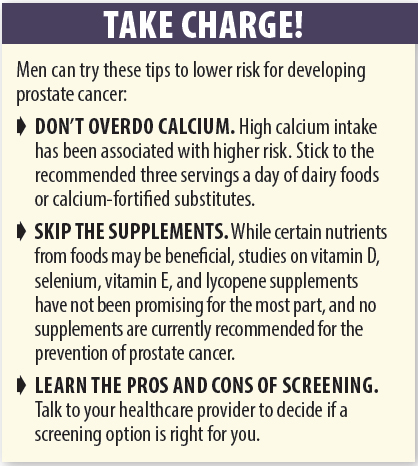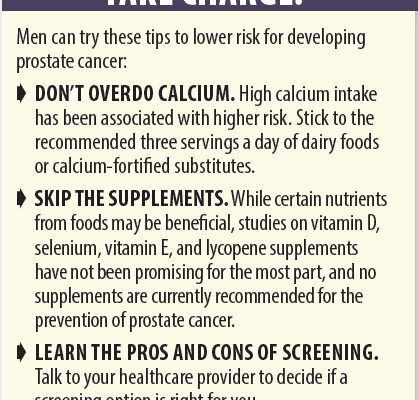What You Need to Know about Prostate Cancer
Prostate cancer is the second most common cancer among men in the U.S. and around the globe. Worldwide, there are nearly a million new cases diagnosed every year. In honor of National Men’s Health Month, let’s take a closer look at how diet and lifestyle choices may help reduce risk for this common condition.
The Facts.
“The prostate is an organ within the urinary tract that is situated under a man’s bladder,” says Tony Luongo, MD, a urologist at Tufts Medical Center. “Its major function is the storage of seminal fluid.” It’s not clear what causes some cells in this small, walnut-shaped gland to become cancerous.
Men over age 65 are more likely to develop prostate cancer than younger men. Those with a family history of prostate cancer are at increased risk, and, for unknown reasons, risk is as much as 80 percent higher in American men of African ancestry than in white men. While excess weight does not seem to be a risk factor for prostate cancer, men with obesity may have a somewhat higher risk of aggressive cancer.

Specific Foods and Risk.
Certain foods have been studied for their possible impact on prostate cancer risk.
- Soy: A number of studies have suggested intake of non-fermented soy products (such as tofu, soymilk, and edamame) may be beneficial in lowering prostate cancer risk. Soybeans are a good source of phytonutrients called isoflavones, which are considered a likely suspect behind these potential benefits (although research does not yet support the recommendation of isoflavone supplements).
- Meat: “Intake of red and processed meats has been associated with higher incidence of cancer in general, and prostate cancer specifically,” says Rachel Wilkinson, MS, RD, a registered dietitian at the Frances Stern Nutrition Center at Tufts Medical Center. Although study results are mixed overall, a recent study that followed more than 470,000 people for over 11 years found following a dietary pattern that was vegan, vegetarian, or pescatarian (eating fish but not meat or poultry) was associated with a lower risk of prostate cancer.
- Dairy: Some studies have found an association between high intake of dairy products—particularly full fat dairy—and higher risk of prostate cancer, although other studies have not.
Specific Nutrients and Risk.
Some nutrients are associated with lower risk, while excess intake of others is associated with higher risk.
- Saturated Fat: Both red meat and full-fat dairy contain saturated fatty acids. The association between fat intake and prostate cancer risk remains controversial, but one study that followed over 288,000 men for nine years found that high intake of saturated fat was associated with a higher risk of prostate cancer than low intake.
- Calcium: Intake of calcium at levels over 2,000 milligrams (mg) a day has been associated with higher risk of prostate cancer. “To avoid overdoing calcium intake, get the recommended 1,000 to 1,200 mg of calcium a day from food rather than supplements (unless your healthcare provider recommends otherwise),” says Wilkinson. “That’s the equivalent of about three servings of dairy or calcium-fortified beverage a day.”
- Vitamin D: Although early observational studies have suggested an association between higher blood levels of vitamin D and lower risk of prostate cancer, this observation was not supported by either a recent analysis of circulating levels of vitamin D in nearly 23,000 prostate cancer cases nor a nationwide, randomized, placebo-controlled trial involving nearly 26,000 participants who were supplemented with 2,000 International Units of vitamin D a day for 5 years. So, vitamin D does not seem to prevent prostate cancer.
- Vitamin E and selenium: Some early studies suggested taking vitamin E or selenium supplements might lower prostate cancer risk, but a large randomized controlled intervention study called the Selenium and Vitamin E Cancer Prevention Trial (SELECT) found no significant benefit to either supplement.
- Lycopene: You may have heard claims that eating tomato sauce is a good way to prevent prostate cancer. Tomatoes and tomato products (like sauce and paste) are top sources of the phytonutrient lycopene, which is also found in other red and pink fruits and vegetables (like watermelon, pink grapefruit, and red peppers). Observational studies suggest intake of tomato products or lycopene are associated with lower risk of prostate cancer, but randomized controlled trials have not shown a benefit of lycopene supplements, and a meta-analysis of casecontrol studies did not find a relationship between higher circulating serum lycopene concentrations and lower risk of developing prostate cancer.
What to Do.
To help reduce prostate cancer risk, experts recommend starting with behaviors that support overall health and are associated with lower cancer risk in general. These include being physically active, maintaining a heathy weight, and following a healthy dietary pattern.
The best way to get enough potentially protective nutrients and avoid excess intake of potential harmful foods or nutrients is to consume a healthy dietary pattern. Aim for a diet that includes plenty of fruits and vegetables (including tomatoes and other pink or red choices) for lycopene and other beneficial vitamins, minerals, and phytonutrients, along with nuts, plant oils, and whole grains (which contain, among other things, selenium and vitamin E). Limit red and processed meats (try replacing some with soy foods!) and stick to the recommended three servings a day of dairy foods. For overall health and general cancer prevention, include seafood in your diet, avoid added sugars, excess sodium, and highly processed foods, limit alcohol intake to two or less drinks a day (one if you’re a woman), and aim to get moving for at least 150 minutes a week.
If you are considering getting screened for prostate cancer, it’s important to be aware of the potential risks and benefits. While catching prostate cancer early may reduce risk of death, potential risks of screening include false-positive results that require additional testing and possible prostate biopsy; unnecessary treatment of small cancers that would not otherwise cause problems for many years; and treatment complications, such as incontinence and erectile dysfunction. “Men should discuss the risks and benefits of screening with their doctor and make an informed decision,” Luongo says. Prostate cancer screening is not recommended men ages 70 and older.

The post What You Need to Know about Prostate Cancer appeared first on University Health News.
Read Original Article: What You Need to Know about Prostate Cancer »


